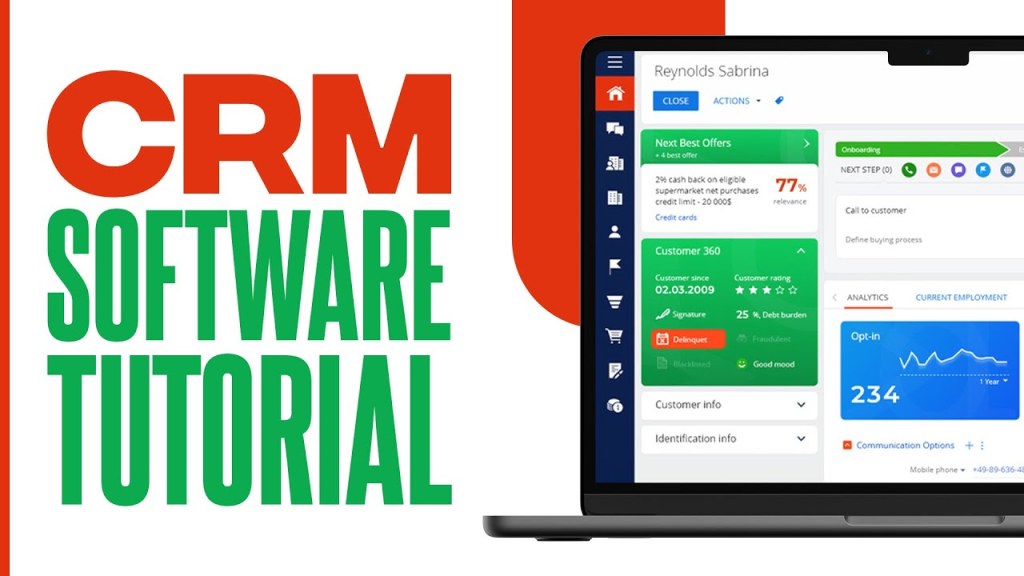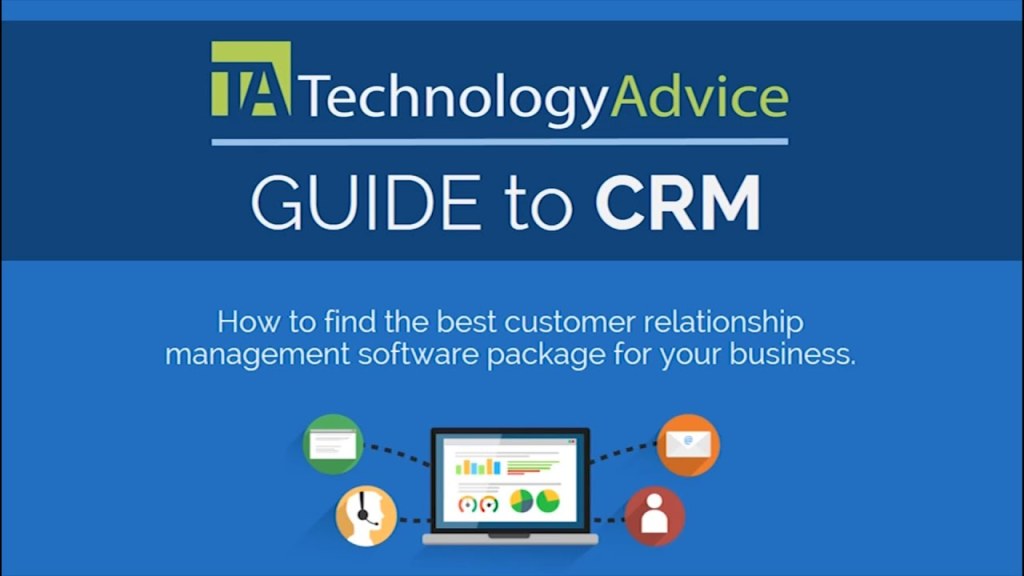Mastering CRM Software: Unlock The Power With Our Comprehensive Tutorial!
Software CRM Tutorial: An In-Depth Guide for Effective Customer Relationship Management
Introduction
Hello Readers,
3 Picture Gallery: Mastering CRM Software: Unlock The Power With Our Comprehensive Tutorial!



Welcome to our comprehensive tutorial on software CRM (Customer Relationship Management). In today’s increasingly competitive business landscape, maintaining strong relationships with customers is crucial for success. CRM software provides businesses with the tools and strategies to effectively manage and enhance their interactions with customers, resulting in improved customer satisfaction and increased sales.

Image Source: ytimg.com
In this tutorial, we will delve into the world of software CRM, exploring its various aspects, benefits, limitations, and implementation strategies. Whether you are a business owner, a sales representative, or a CRM enthusiast, this guide aims to equip you with the knowledge and skills to leverage CRM software effectively. Let’s dive in!
Overview: What is Software CRM?
CRM software refers to a set of technological tools and platforms designed to streamline and automate customer relationship management processes. It enables businesses to effectively manage customer interactions, track leads and sales, analyze customer data, and improve overall customer satisfaction. By centralizing customer information and providing real-time insights, CRM software empowers businesses to personalize their marketing efforts, anticipate customer needs, and build strong, long-term relationships.
Understanding the Importance of CRM Software
Effective customer relationship management is the key to sustainable business growth. By implementing CRM software, businesses can benefit in several ways:

Image Source: ytimg.com
🔹 Enhanced Customer Satisfaction: CRM software allows businesses to track customer interactions, preferences, and purchase history, enabling personalized and targeted marketing campaigns. This results in improved customer satisfaction and loyalty.
🔹 Streamlined Sales Processes: CRM software provides sales representatives with a centralized platform to manage leads, track opportunities, and streamline the sales pipeline. This improves efficiency, reduces manual tasks, and increases sales productivity.

Image Source: ytimg.com
🔹 Data-Driven Decision Making: CRM software generates powerful analytics and reports, providing businesses with valuable customer insights. This data-driven approach enables informed decision-making, identifying trends, and optimizing marketing strategies.
🔹 Improved Collaboration: CRM software fosters collaboration among teams by providing a shared platform for customer information, communication logs, and task management. This enhances internal communication and ensures a consistent customer experience.
🔹 Scalability and Flexibility: CRM software can be customized and scaled according to the specific needs of a business. It can integrate with other business systems, such as marketing automation and email marketing platforms, to streamline processes and maximize efficiency.
🔹 Competitive Advantage: By leveraging CRM software effectively, businesses can gain a competitive edge in the market. It enables targeted marketing efforts, efficient sales processes, and personalized customer experiences, resulting in increased customer acquisition and retention.
Implementing CRM Software: Who Can Benefit?
CRM software is beneficial for businesses of all sizes and across various industries. Here are some key stakeholders who can harness the power of CRM software:
🔹 Small and Medium-Sized Businesses (SMBs): CRM software provides SMBs with an affordable and scalable solution to manage their customer relationships effectively. It helps them compete with larger enterprises by providing tools for lead management, sales automation, and customer analytics.
🔹 Sales and Marketing Teams: CRM software equips sales and marketing teams with the tools to manage leads, nurture prospects, track customer interactions, and measure campaign performance. It enables collaboration and streamlines processes, resulting in improved sales efficiency and marketing effectiveness.
🔹 Customer Support and Service Teams: CRM software benefits customer service teams by providing a holistic view of customer information, communication history, and issue resolution. It facilitates efficient ticket management, ensures prompt response times, and enables personalized customer support.
🔹 E-commerce Businesses: CRM software plays a vital role in e-commerce businesses by tracking customer behavior, preferences, and purchase history. It enables personalized product recommendations, targeted email marketing, and effective customer retention strategies.
🔹 Enterprise-Level Organizations: Large enterprises can leverage CRM software to manage complex sales cycles, multiple customer touchpoints, and extensive customer data. It provides real-time insights, streamlines processes, and enables effective management of large sales teams.
When to Implement CRM Software?
The decision to implement CRM software depends on various factors, such as the size of the business, growth objectives, and customer relationship management needs. Here are some scenarios where implementing CRM software is beneficial:
🔹 Business Expansion: When a business is expanding its customer base, CRM software helps manage the growing volume of customer data, streamline sales processes, and ensure consistent customer experiences.
🔹 Sales Pipeline Optimization: If a business wants to optimize its sales pipeline, improve lead nurturing, and track sales activities effectively, CRM software can provide the necessary tools and analytics.
🔹 Marketing Campaign Management: CRM software enables businesses to manage marketing campaigns efficiently, track campaign performance, and measure return on investment. It helps personalize marketing efforts and target specific customer segments.
🔹 Customer Service Enhancement: When a business aims to enhance customer service and support, CRM software assists in managing customer inquiries, tracking issue resolution, and providing timely and personalized support.
🔹 Data-Driven Decision Making: If a business wants to adopt a data-driven approach to decision making, CRM software offers valuable customer insights, analytics, and reporting capabilities.
Where to Find Reliable CRM Software?
Choosing the right CRM software is crucial for successful implementation. Here are some reliable sources to find CRM software:
🔹 Vendor Websites: Many CRM software vendors have their official websites where businesses can access information, compare features, and request demos or trials.
🔹 Online Directories: Online directories, such as Capterra, G2, and Software Advice, provide comprehensive listings and reviews of CRM software solutions. These platforms allow businesses to compare multiple options and read user testimonials.
🔹 Industry Events and Conferences: Attending industry events and conferences provides opportunities to explore various CRM software options and connect with vendors. These events often feature demos and presentations to help businesses make informed decisions.
🔹 Referrals and Recommendations: Seek recommendations from peers, industry influencers, or consultants who have experience with CRM software. Their insights and firsthand experiences can help businesses choose the right solution.
Why Should Your Business Invest in CRM Software?
Investing in CRM software offers numerous benefits that directly contribute to business growth and success:
🔹 Improved Customer Retention: CRM software helps businesses provide personalized experiences, timely support, and tailored marketing efforts, resulting in increased customer retention rates.
🔹 Increased Sales Revenue: By streamlining sales processes, tracking leads, and providing sales teams with powerful analytics, CRM software enhances sales productivity and drives revenue growth.
🔹 Enhanced Customer Satisfaction: CRM software enables businesses to understand customer needs, preferences, and pain points, allowing them to deliver exceptional customer service.
🔹 Streamlined Processes: CRM software automates manual tasks, eliminates data silos, and provides a centralized platform for streamlined collaboration, resulting in increased operational efficiency.
🔹 Competitive Advantage: By leveraging CRM software effectively, businesses gain a competitive edge by delivering personalized experiences, targeted marketing campaigns, and efficient sales processes.
How to Implement CRM Software Successfully?
Implementing CRM software requires careful planning and execution. Here are some essential steps to ensure successful implementation:
🔹 Set Clear Objectives: Define the goals and objectives your business aims to achieve with CRM software. This helps align implementation efforts and measure success accurately.
🔹 Choose the Right CRM Software: Evaluate various CRM software options and choose a solution that aligns with your business requirements, budget, and scalability needs.
🔹 Train and Educate Users: Provide comprehensive training to all users who will interact with the CRM software. This ensures proper utilization and adoption across the organization.
🔹 Customize and Configure: Tailor the CRM software to match your business processes and requirements. Configure settings, data fields, and workflows to ensure seamless integration with existing systems.
🔹 Data Migration: Plan and execute a smooth data migration process to transfer existing customer data to the CRM software. Ensure data accuracy and integrity throughout the migration.
🔹 Test and Optimize: Conduct thorough testing to identify any issues or discrepancies. Continuously optimize the CRM software based on user feedback and evolving business needs.
🔹 Monitor and Measure: Regularly monitor key performance indicators and metrics to evaluate the effectiveness of the CRM software. Use these insights to make data-driven improvements and drive continuous growth.
Advantages and Disadvantages of CRM Software
While CRM software provides numerous advantages, it also has certain limitations. Here are some advantages and disadvantages to consider:
Advantages:
1. Increased Efficiency: CRM software automates manual tasks, reduces duplication of efforts, and improves overall operational efficiency.
2. Improved Customer Relationships: By centralizing customer information, CRM software enables personalized and targeted interactions, resulting in stronger customer relationships.
3. Enhanced Sales Processes: CRM software streamlines lead management, opportunity tracking, and sales pipeline management, resulting in increased sales productivity.
4. Data-Driven Decision Making: CRM software generates powerful analytics and insights, empowering businesses to make informed decisions and optimize marketing strategies.
5. Collaboration and Team Alignment: CRM software provides a shared platform for teams to collaborate, ensuring consistent communication and a unified approach to customer management.
Disadvantages:
1. Implementation Challenges: Implementing CRM software can be complex and time-consuming, requiring proper planning, training, and data migration.
2. Cost Considerations: CRM software can involve significant costs, including licensing fees, customization expenses, and ongoing maintenance and support.
3. Data Security Risks: Storing large amounts of customer data in a CRM software system requires robust security measures to protect against potential breaches.
4. User Adoption: Encouraging all users to embrace and fully utilize CRM software can be a challenge. Proper training and change management strategies are essential for successful adoption.
5. System Integration: Integrating CRM software with existing systems and processes can be complex, requiring technical expertise and potential system disruptions.
Frequently Asked Questions (FAQs)
Q1: Can CRM software be customized to match specific business requirements?
A1: Yes, most CRM software solutions offer customization options to tailor the software to match the unique needs and processes of a business.
Q2: Is CRM software suitable for small businesses?
A2: Absolutely! CRM software caters to businesses of all sizes. Many solutions offer affordable plans specifically designed for small and medium-sized businesses.
Q3: How long does it take to implement CRM software?
A3: The implementation timeline varies depending on the complexity of the business processes and the chosen CRM software. It can range from a few weeks to several months.
Q4: Can CRM software integrate with other business systems?
A4: Yes, CRM software can integrate with various business systems, such as email marketing platforms, marketing automation tools, and e-commerce platforms, to streamline processes and data exchange.
Q5: What kind of support is available for CRM software users?
A5: CRM software vendors typically provide customer support through various channels, including phone, email, and live chat. They often offer documentation, tutorials, and user forums to assist users.
Conclusion
In conclusion, CRM software serves as a powerful tool for businesses to effectively manage customer relationships, streamline sales processes, and drive growth. By implementing CRM software, businesses can enhance customer satisfaction, improve sales productivity, and gain a competitive advantage in the market. Remember to choose the right CRM software, ensure proper implementation, and continuously optimize its usage to unlock its full potential. Get started today and experience the transformational impact of software CRM!
Final Remarks
Dear Readers,
As we conclude this tutorial on software CRM, we hope you have gained valuable insights into the world of customer relationship management. Implementing CRM software can be a game-changer for businesses, enabling them to build strong customer relationships, boost sales revenue, and enhance operational efficiency. However, it is essential to approach CRM implementation strategically, considering the specific needs and objectives of your business.
Remember, successful CRM implementation requires careful planning, user training, and continuous optimization. As technology evolves and customer expectations change, businesses must adapt and leverage CRM software to stay competitive in the dynamic business landscape.
Thank you for joining us on this informative journey. We wish you success in effectively implementing and harnessing the power of CRM software for your business.
This post topic: Software Tutorials

